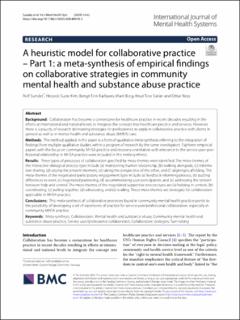A heuristic model for collaborative practice – Part 1: A meta-synthesis of empirical findings on collaborative strategies in community mental health and substance abuse practice
Peer reviewed, Journal article
Published version
Permanent lenke
https://hdl.handle.net/11250/2739545Utgivelsesdato
2020Metadata
Vis full innførselSamlinger
Originalversjon
Sundet, R., Kim, H. S., Karlsson, B. E., Borg, M., Sælør, K. T., & Ness, O. (2020). A heuristic model for collaborative practice–Part 1: a meta-synthesis of empirical findings on collaborative strategies in community mental health and substance abuse practice. International Journal of Mental Health Systems, 14, 42. https://doi.org/10.1186/s13033-020-00376-5Sammendrag
Background: Collaboration has become a cornerstone for healthcare practice in recent decades resulting in the efforts at international and national levels to integrate the concept into healthcare practice and services. However, there is a paucity of research delineating strategies for professionals to apply in collaborative practice with clients in general as well as in mental health and substance abuse (MHSA) care.
Methods: The method applied in this paper is a form of qualitative meta-synthesis referring to the integration of findings from multiple qualitative studies within a program of research by the same investigators. Eighteen empirical papers with the focus on community MHSA practice and recovery-orientation with relevance to the service user–professional relationship in MHSA practice were included in this meta-synthesis.
Results: Three types of processes of collaboration specified by meta-themes were identified. The meta-themes of the interactive-dialogical process type include (a) maintaining human relationship, (b) walking alongside, (c) information sharing, (d) seizing the present moment, (e) taking the perspective of the other, and (f ) aligning/scaffolding. The meta-themes of the negotiated-participatory engagement type include (a) feedback-informing process, (b) putting differences to work, (c) negotiated partnering, (d) accommodating user participation, and (e) addressing the tension between help and control. The meta-themes of the negotiated supportive process type are (a) helping in context, (b) coordinating, (c) pulling together, (d) advocating, and (e) availing. These meta-themes are strategies for collaboration applicable in MHSA practice.
Conclusions: This meta-synthesis of collaborative processes found in community mental health practice points to the possibility of developing a set of repertoires of practice for service user/professional collaboration, especially in community MHSA practice.

